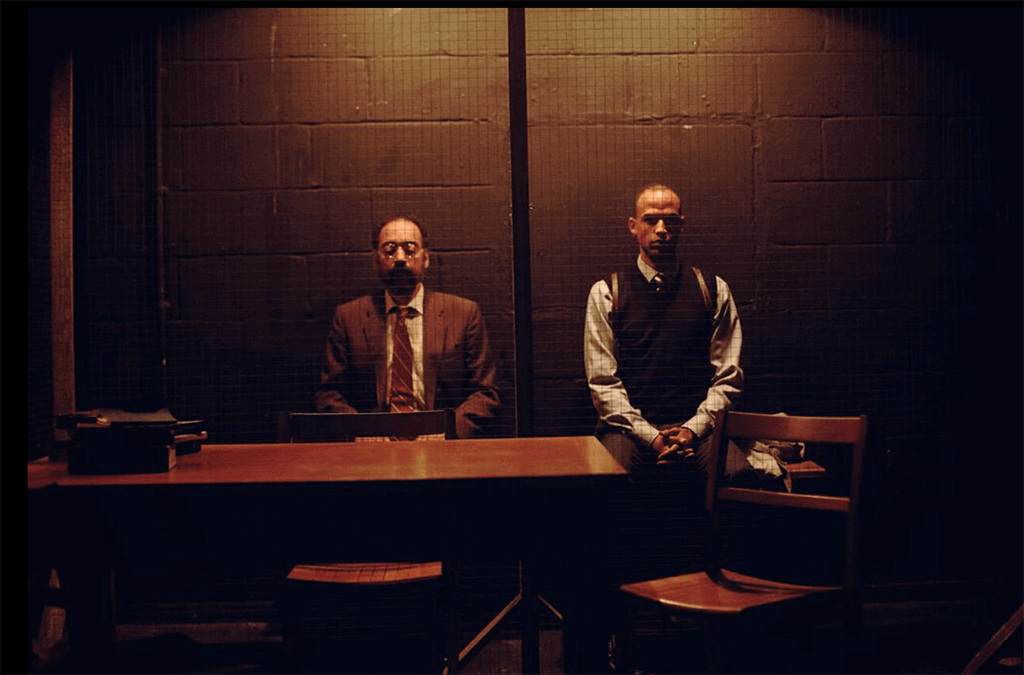Set in South Africa in 1985, Athol Fugard’s ‘My Children! My Africa!’ (1989) is all about divisions and oppositions: black and white, younger and older generation, inside and outside, violence and non-violence, the past and the future. But it is also about transitions and spaces in-between, and the difficulties faced by those caught amid imposed extremes, trapped by their situation.
Thami (Nathan Ives-Moiba) is the much-prized 18 year-old student of the Bantu teacher and intellectual Mr M (Antony Ofoegbu). When the play opens, he is taking part in a debate on the proper place of women in society (another history of injustice) against white pupil Isabel (Rose Reynolds), the setting being the township school Thami attends. The two opponents bond easily, and sweetly, as friends after the debate (which is organised by Mr M), while the stage space immediately highlights the harsh environment in which they live, the audience separated from the performers by a barbed wire fence, with different entrances shown for whites and non-whites behind. Both Thami and Isabel are aware that this is a rare opportunity for them to get to know each other and share their enthusiasms, and Mr M, warmed by the debate’s success, soon arranges for them to compete together as a combined force in another schools competition, acting himself as mentor and encourager to these students from different worlds, yet with plenty in common.
Mr M initially appears as an owlish, gentle, fusty presence, with a keen love of learning and a passion to nurture it in others (particularly Thami) – but there is a barely-suppressed rage there. There is righteous anger about the current social and political situation in South Africa, which has caused so much division and hatred, but also a desperate, defiant clinging to the message of hope and non-violent resolution, as opposed to the danger represented by the rising, revolutionary mob growing throughout ‘The Location’ (as the township is referred to) which begins to pull Thami towards it. This schism regarding how to challenge apartheid continues to push teacher and pupil apart, with Isabel locked between both polarities.
As so often with Fugard, much depends on the penetrative power and resonance of the words, the drama conveyed mainly via monologue and dialogue, in a single space, and with only three people in the play there is tendency for there to be a repetition of topic and emphasis, with some of the points made being rather heavy-handed and obviously symbolic (there is a key moment when Mr M weighs up the alternative between dictionary and rock as a weapon). However, it is hard to judge this too negatively when taking into account the environment Fugard’s theatre originates in, and the forces and strictures he had to continuously struggle against to get his work performed. Indeed, there is an important sense of bearing witness in his writing, and it must have served also partly as a form of reportage to audiences at the time (and can remain so now, in the future, looking back on a previous decade, shining a light on the specific, direct effects of apartheid).
In addition the actors really do convince, you believe that they believe in what they are saying, however idealistic or naive it seems, and this stops them being mere ciphers. Isabel can appear a little too pure and cloying, but you feel for her when realizing what she’s up against, while the raging of Mr M, shouting into the wind, determined to convince, painfully reinforces the interminable, claustrophobic hellishness of his existence and how thwarted, frustrated and broken he is.
Great works of the past, and the pleasures, thoughts and debates they inspire, allow the characters to have a shared freedom which they are normally denied. This is particularly affecting when Isabel and Thami enthusiastically swap facts about 19th Century literature and Romantic poets together in preparation for their quiz competition, culminating in a joint recitation of ‘Sea Fever’ by John Masefield (this also pointing to the English Colonial educational tradition which would have deemed such authors as canonical in South Africa). Mr M also speaks of his devotion to Confucius, and the mental travelling possible to him via his beloved old books, giving him permission to visit places he has no physical access too.
What is often so affecting about Fugard is those quieter, gentler, moments, the vivid word pictures conjured up as the characters talk to each other and the audience, the living, everyday pictures which emerge between the polemics. We hear of Mr M forever hurrying between the two places he inhabits (his bedroom and school room), and his rural revelation about the Vaal and Limpopo, and the rest of Africa, stretching away from him, beyond the township. The close, heartfelt, communion between the individuals, normally separated, but for a moment in a safe space set apart from outside, is also given added intensity and fragility by the awareness that this can, for the moment, only be brief. The play here recalls parts of Fugard’s earlier three actor play ‘‘Master Harold’…and the boys’, in particular the bond shared in that work between Sam and Harold when flying a kite together, soon broken in the social world by the different public benches for whites and blacks. Violence and discord end ‘My Children! My Africa!’, with an unknown future to come, but there is still hope that individuals can get outside the prison they’ve been raised in, if only for a short time.

